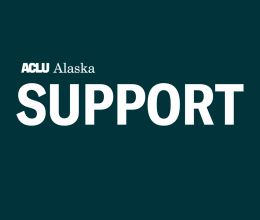
The following was published as an opinion editorial by Megan Edge, Prison Project Director, in the Anchorage Daily News on June 17, 2024. The original piece can be found here.
Almost exactly two years ago, a longtime reentry and homeless advocate called to share the story of the life and death of Kitty Douglas. The 20-year-old from the traditionally Iñupiaq village of White Mountain — captured in photographs with a sweet, girlish grin — died at Hiland Mountain Correctional Center in June 2022, days after being booked on charges that never appear to have been filed.
At the end of this past May, when I read the complaint filed in court by the lawyers seeking justice for Kitty’s family, I was overwhelmed. The Department of Corrections, or DOC, would finally be held accountable for its failure to protect a woman forced into their custody. Finally, there would be some semblance of justice for a life lost too young. But in my heart, I know that ultimate justice for Kitty would have been the ability to access the resources she needed to be healthy, well and alive.
Kitty moved to Anchorage as a young adult looking for new opportunities. Here, she became victim to Alaska’s failing social welfare systems, and struggled with mental health and housing security. In the early summer of 2022, she was using the services of the city’s only mass, low-barrier shelter. But the municipality had decided to close the shelter, leaving people to fend for themselves in the woods of Centennial Park. During the eviction, Kitty was arrested for criminal mischief. Case workers tried to intervene — Kitty was young enough to seek other shelter at Covenant House — but police officers ignored their pleas.
Instead, Kitty was booked at the Anchorage Correctional Complex and transferred to Alaska’s women’s prison in Eagle River. As shared with us from case workers, advocates and her own family, Kitty’s battles with mental health issues were well documented, including her most recent mental health evaluation conducted just days before her death.
But DOC ignored her symptoms and failed to follow its own protocol.
Kitty Douglas was found dead in her cell at 7:18 p.m. on June 11, 2022, less than one week after being incarcerated. She was found by correctional officers an hour after she died by suicide.
We have a lot of questions about what happened during the final weeks and hours of her life.
But we know enough to know her death was preventable … if only.
If only Anchorage had a stable system for helping those suffering from homelessness, instead of using the poor as political pawns.
If only the police officers who interacted with her used their discretion to allow the case workers who could help her to actually help her.
If only Alaska had adequate mental health resources.
If only DOC wouldn’t have ignored the signs and provided the support Kitty needed.
I’ve learned a lot about Kitty since her death. She was a daughter and friend. She was loved by many.
She has also been a tragic inspiration to the Alaska Prison Project.
Hers was the first death we investigated. Now, we investigate every death in DOC custody. What we’ve learned has been devastating. Kitty’s story isn’t unique.
Thirty-nine people have died in DOC’s care since the start of 2022 — the majority were under 40, in DOC custody only a short time, and more than half hadn’t been convicted of a crime. The dead are disproportionately Alaska Native.
Last year, 52 homeless people died in Anchorage.
It’s easy to look at people like Kitty and all of the people dying in jail cells, homeless camps or shackled to hospital beds, as people living the fate of their own choices. But people are complicated. “Homeless,” “inmate,” “addict,” “mentally ill” — or whatever society has labeled our most vulnerable, aren’t identities, they are circumstances that can be overcome.
Kitty was punished for being human, not harmful.
We can’t incarcerate our way out of our problems. We must meet the needs of the people, instead of punishing them for having needs. If we did this, maybe Kitty Douglas would still be alive.
Megan Edge is the ACLU of Alaska Prison Project Director, former journalist and DOC employee, as well as a lifelong Alaskan.




